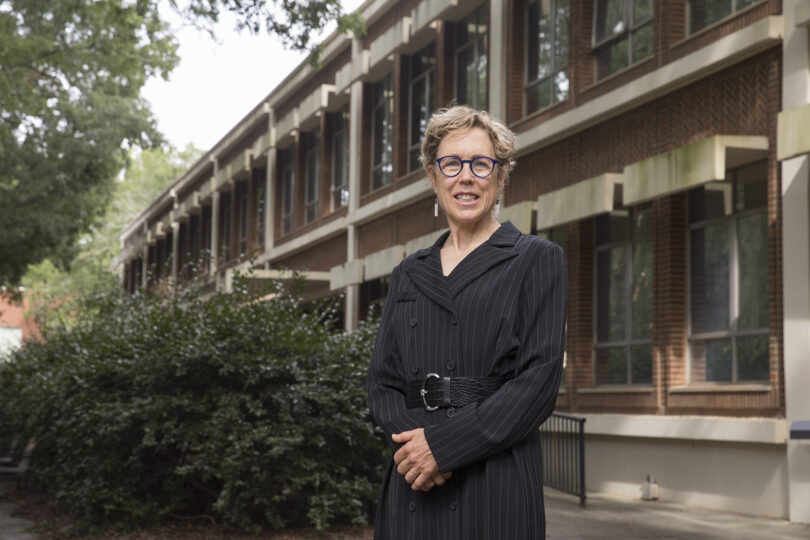Sally E. Walker, the Shellebarger Professor in Geology in the Franklin College of Arts and Sciences, gives students field research experiences through which they propose hypotheses, collect and analyze data, and communicate their findings.
When did you come to UGA and what brought you here?
I came to UGA in fall 1993 to take a paleontology position in the department of geology, which is part of the Franklin College of Arts and Sciences. The geology department was both well known for excellence in paleontology and also having access to the unique and special Sapelo Island, a barrier island on the Georgia coast, for research and teaching. Nowhere else in the world can you go to a non-urbanized island and work in so many environments that are in close proximity to each other (dune, beach, marsh, maritime forest, ocean) and see geological and biological processes happen before your eyes.
What are your favorite courses and why?
My favorite courses concern connections: how evolution of life on Earth affected geological and atmospheric processes and vice versa. The naturalist John Muir remarked, “When we try to pick out anything by itself, we find it hitched to everything else in the Universe.” The birth of elements emanating from the big bang and supernova explosions are those same elements that form life on Earth. When photosynthesis evolved, life forever changed our hot, acidic atmosphere to an oxygenated one, contributing to our first ice age 2.2 billion years ago. Increase in biotic oxygen led to larger and more complex life and also new minerals/ores. When biocarbon was buried, it became coal or petroleum, cooling Earth; but in the last 200 years, humans have burned those fossil fuels, leading to hotter climates, higher sea levels, and major humanitarian/economic crises unless sustainable practices are achieved. After all, we are hitched to everything else.
How do you describe the scope and impact of your research or scholarship to people outside of your field?
I work in fossil forensics: I am curious about how clams and snails store environmental information in their carbonate shells and how that information can be used to reconstruct climates, ecological interactions and environments of the past. With colleagues, I helped start the longest running field experiment concerning biotic carbonate from shelf to deep-sea environments in the Gulf of Mexico and Bahamas. We found that deep-sea ecological processes that affect shell preservation are just as complex as those in shallower water, against prevailing ideas at the time. We also successfully cracked the code on the stable isotopes preserved in the shell of Stephen Jay Gould’s favorite Bahamian land snail, Cerion, which revealed seasonal cyclicity when it was thought not to occur. Currently, we hope to unlock the climatic record archived in modern and fossil shells of the Antarctic scallop to reveal past sea-ice fluctuations in the Cenozoic record.
How does your research or scholarship inspire your teaching, and vice versa?
Research and teaching are one. From the research side, I am a field scientist; therefore, all my undergraduate classes are designed with a field component where they go in the field, have to propose hypotheses, collect and analyze data, write up their results and conclusions for their scientific paper and then present their results to their peers during a class symposium. That all might sound easy, but it is not, as scientific thinking and writing are not in K-12 curricula, and field and lab experiences—where students can build common sense and gain confidence in their practice—are getting fewer and farther between. Teaching informs my research by allowing me to read widely to keep up with the latest scientific discoveries to present to my students. I especially like to see how students think, and I try out new teaching ideas on them; their questions, too, help make my learning richer.
What do you hope students gain from their classroom experience with you?
I hope that they learn that the scientific process is based on honesty, logic, parsimony and not extrapolating beyond one’s data. I also hope that they learn that they are hitched to everything on Earth and in the universe.
The one UGA experience I will always remember will be …
… that special moment when you see the student’s face change from anxiety and puzzlement to pure joy as they figure out and solve a long-standing problem concerning their research or how to communicate science. Scientists love those “aha moments,” and so do teachers!








